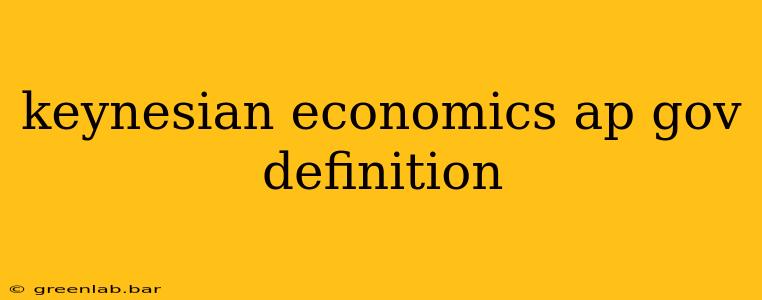Keynesian economics, a cornerstone of macroeconomic theory, offers a powerful framework for understanding and managing national economies, particularly during periods of recession or depression. For AP Government students, grasping its core tenets is crucial for analyzing government policy and its impact on the broader economy. This article provides a detailed definition, explores its key principles, and examines its relevance in contemporary political discourse.
What is Keynesian Economics?
At its heart, Keynesian economics, named after the influential British economist John Maynard Keynes, argues that aggregate demand plays a crucial role in determining overall economic output and employment. Unlike classical economic theory, which emphasizes the self-correcting nature of markets, Keynesianism posits that markets can experience prolonged periods of underperformance, characterized by high unemployment and low investment. This perspective fundamentally alters the role of government intervention.
Core Principles of Keynesian Economics:
-
Demand-Side Focus: The central tenet is the importance of aggregate demand – the total spending in an economy – as the primary driver of economic growth. Insufficient demand leads to recessionary conditions.
-
Government Intervention: Keynesian economics advocates for active government intervention to stabilize the economy, particularly during recessions. This intervention takes the form of fiscal policy (government spending and taxation) and, to a lesser extent, monetary policy (interest rates and money supply controlled by central banks).
-
Multiplier Effect: A key concept is the "multiplier effect," which suggests that an initial increase in government spending or private investment can lead to a proportionally larger increase in overall economic output. This is because the initial spending creates income for others, who then spend a portion of that income, creating further income and spending, and so on.
-
Fiscal Policy Tools: Keynesians generally favor expansionary fiscal policy during recessions. This involves increasing government spending (e.g., infrastructure projects, social programs) and/or cutting taxes to stimulate aggregate demand. Conversely, during periods of inflation, contractionary fiscal policy (reducing spending and/or raising taxes) is recommended to cool down the economy.
-
Role of Expectations: Keynesian economics emphasizes the role of expectations in shaping economic behavior. Businesses and consumers' expectations about future economic conditions influence their current spending and investment decisions. Government policy can aim to influence these expectations.
Keynesian Economics and AP Gov: Real-World Applications
Understanding Keynesian principles is vital for analyzing various government policies. Here are some examples relevant to AP Government:
-
The New Deal: Franklin D. Roosevelt's New Deal programs during the Great Depression are often cited as a prime example of Keynesian economics in practice. Massive government spending on infrastructure projects and social programs aimed to boost aggregate demand and reduce unemployment.
-
Stimulus Packages: Modern economic stimulus packages, such as those implemented during the 2008 financial crisis, are rooted in Keynesian principles. Governments inject money into the economy to counter recessionary pressures.
-
Debates over Government Debt: Keynesian economics often leads to debates about the appropriate level of government debt. While expansionary fiscal policy can boost the economy in the short term, it may increase national debt, raising concerns about long-term fiscal sustainability. This tension is a frequent topic in political debates.
-
Monetary Policy Coordination: While Keynesian economics primarily focuses on fiscal policy, it also recognizes the role of monetary policy. Central banks' actions in managing interest rates and the money supply can complement fiscal policy measures to stabilize the economy.
Critiques of Keynesian Economics:
While influential, Keynesian economics has faced criticism:
-
Time Lags: The effectiveness of fiscal policy can be hampered by significant time lags between policy implementation and its impact on the economy.
-
Crowding Out: Government borrowing to finance increased spending might "crowd out" private investment by raising interest rates.
-
Inflationary Pressures: Expansionary fiscal policy can lead to inflationary pressures if the economy operates near its full capacity.
-
Government Inefficiency: Critics argue that government spending may be less efficient than private sector investment in stimulating economic growth.
Conclusion:
Keynesian economics provides a crucial framework for understanding government's role in managing the economy. Its principles, strengths, and limitations are essential for analyzing current events and political debates within the context of AP Government. By understanding its core tenets, students can effectively engage with complex economic issues and their political ramifications.

